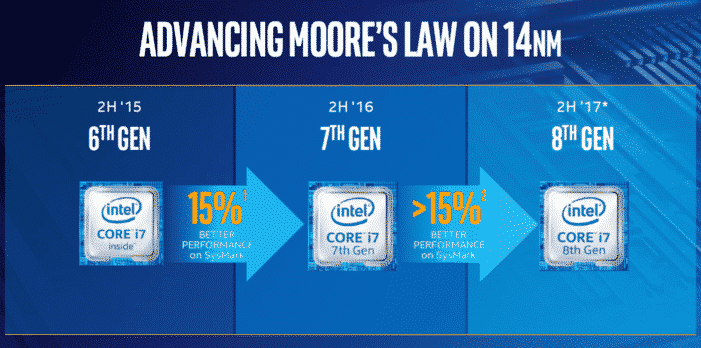For the past few years Intel has been unable to stick to its tick-tock cadence for changes to its micro architecture and 2017 will mark yet another year where the semiconductor giant has been unable to stick on to Moore’s Law.
The new 8th generation processors will use the same architecture as its predecessors, with s improvements across the board. Intel calls the refinement a 14nm++ process.
A tweet by analyst Ashraf Eassa also confirms the same stating that the 8th generation Intel Core processors will continue to follow the 14nm process.
This definitely feels like a bummer, considering that AMD is all set to create chaos with its Ryzen CPU line-up as per multiple leaks and rumours. It can be argued that in terms of micro architecture, it’ll be after a really long time, that Intel will actually face stiff competition from AMD. And even with that in mind, it doesn’t plan on doing something revolutionary and stick to minimal performance improvements.
However, one must also take into consideration that when a node shrinks it become more difficult for a semiconductor company to make it shrink further and it also struggles to eek out maximum performance.
That’s why it seems Intel is refining the 14nm process for better efficiency. Intel’s lead in processor fabrication technology has led it to argue that its 14nm chips are better than 10nm chips from rival chipset makers.
Regardless, the 8th generation Core processors are expected to feature a 15 percent performance increase over the Kaby Lake. This was also the case with Skylake and Kaby Lake.
Also, this doesn’t mean Intel isn’t going to come with a 10nm processor. It is still working on it, and it’s expected to power sleek portable convertibles and Ultrabooks which need great performance with refined power consumption and less heat dissipation.
More than that, with the dwindling sales of PCs, Intel’s focus has shifted towards data centres and its Xeon line of processors which power servers in data centres. It is said that Intel will first unleash its 10nm chipsets for data centres.
The new 8th generation processors will use the same architecture as its predecessors, with s improvements across the board. Intel calls the refinement a 14nm++ process.
A tweet by analyst Ashraf Eassa also confirms the same stating that the 8th generation Intel Core processors will continue to follow the 14nm process.
This definitely feels like a bummer, considering that AMD is all set to create chaos with its Ryzen CPU line-up as per multiple leaks and rumours. It can be argued that in terms of micro architecture, it’ll be after a really long time, that Intel will actually face stiff competition from AMD. And even with that in mind, it doesn’t plan on doing something revolutionary and stick to minimal performance improvements.
However, one must also take into consideration that when a node shrinks it become more difficult for a semiconductor company to make it shrink further and it also struggles to eek out maximum performance.
That’s why it seems Intel is refining the 14nm process for better efficiency. Intel’s lead in processor fabrication technology has led it to argue that its 14nm chips are better than 10nm chips from rival chipset makers.
Regardless, the 8th generation Core processors are expected to feature a 15 percent performance increase over the Kaby Lake. This was also the case with Skylake and Kaby Lake.
Also, this doesn’t mean Intel isn’t going to come with a 10nm processor. It is still working on it, and it’s expected to power sleek portable convertibles and Ultrabooks which need great performance with refined power consumption and less heat dissipation.
More than that, with the dwindling sales of PCs, Intel’s focus has shifted towards data centres and its Xeon line of processors which power servers in data centres. It is said that Intel will first unleash its 10nm chipsets for data centres.




0 comments:
Post a Comment